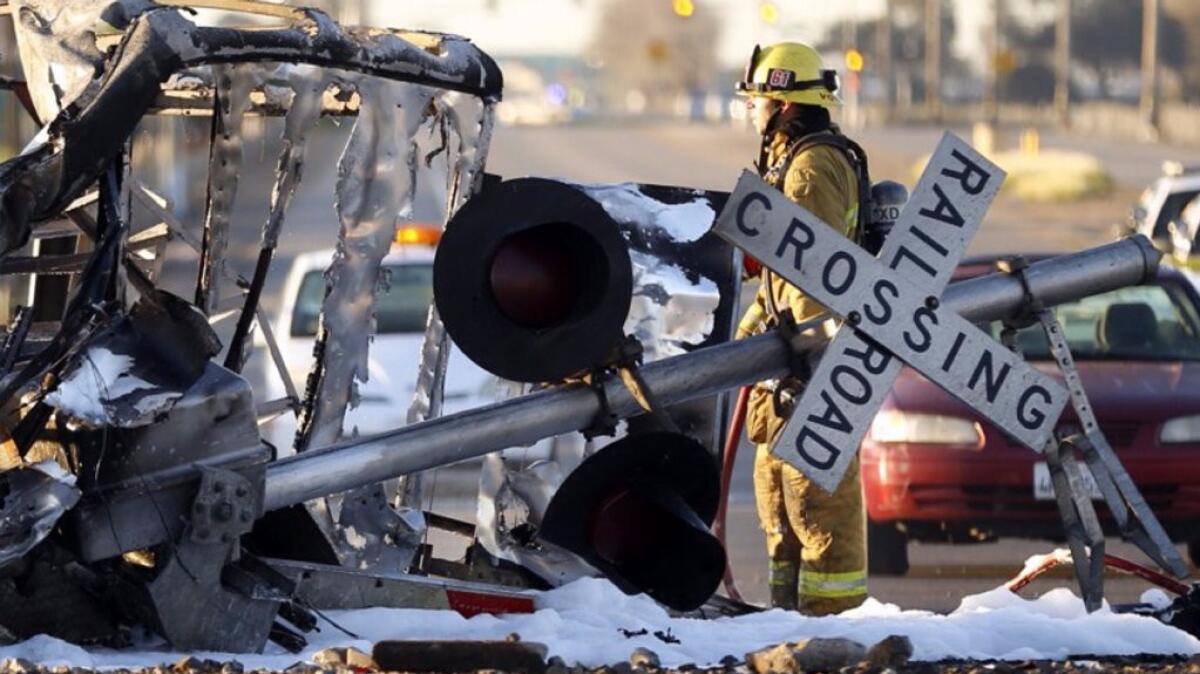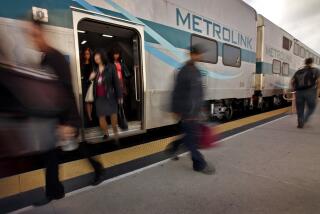Metrolink approves $1.5 million to repair defective cab cars

The board of the Metrolink commuter railroad on Friday unanimously approved $1.5 million to repair dozens of passenger cars with defective parts that were discovered in the wake of last yearâs fatal Oxnard crash.
Rail officials plan to reinforce the front end plows on all 57 Hyundai Rotem cab cars--passenger coaches with an engineerâs station.
One of the Hyundai cars was in the lead position of the Metrolink train that collided on Feb. 24, 2015, with a utility pickup and trailer that had strayed onto the tracks at a rail crossing just outside Oxnard. The engineer was fatally injured and 34 people were hurt in the resulting derailment.
âThe repairs will bring the cab cars up to design standards and resolve the safety issues,â said Art Leahy, the chief executive of Metrolink, which serves six Southern California counties.
The repairs will bring the cab cars up to design standards and resolve the safety issues.
— Art Leahy, the chief executive of Metrolink, which serves six Southern California counties.
An internal investigation into the crash revealed that the plow of the cab carâa device that used to be called a âcow catcher,â and is designed to keep debris and wreckage from getting under train wheelsâbroke off in the collision.
During inspections of all the Hyundai cab cars, investigators found that the plows had defective welds and did not meet specifications for the amount of force they were supposed to withstand.
As part of its investigation, the National Transportation Safety Board is looking into whether the specification and manufacturing issues contributed to the derailment and severity of the crash. No conclusions have been reached yet.
Prompted by the findings of its own report, the Metrolink board decided last fall to temporarily replace the cab cars at the ends of trains with 40 freight locomotives leased for $18 million a year from the Burlington North Santa Fe Railway Co.
However, because of mechanical and operational problems, Metrolink has been slow to put the engines into service. Rail officials say that 31 to 34 BNSF engines now operate daily.
Before voting on the repair funds, board member Roxana Martinez, a Palmdale council member and alternate for L.A. County. Supervisor Michael D. Antonovich, questioned the lease of the freight locomotives.
This could have been addressed months ago.
— Roxana Martinez, a Metrolink board member and Palmdale council member
Martinez asked why the cheaper option of repairing the flawed plows wasnât raised sooner.
âThe proposal with BNSF was a hasty decision. We might have had an option prior to that,â Martinez said. âThis could have been addressed months ago.â
Board member Ara Najarian, a Glendale council member, agreed, saying the repair option should have been the item the board voted on last year instead of the BNSF lease.
Leahy said the lease was necessary because the flawed plows presented Metrolink with a serious safety problem that needed to be addressed immediately.
Karen Spiegel, a board member and Corona council member, defended the rental agreement as well. She said the choice at the time was whether service should be continued in light of the safety concerns.
âIf there was another crash, we would have had more problems than we have today,â she said.
The approved funding will pay for a variety of repairs, including the reinforcement of plow assembly bolts, welds and brackets.
Though a timeline has not been finalized, Leahy said he hoped the work would be done by October so Metrolink can return the locomotives to BNSF and avoid another costly lease.
Follow on Twitter @LADeadline16
ALSO
Dredging likely to wipe away Orange County âdog beach,â at least for a while
Beaumont, stunned by years of alleged corruption, has been âturned upside downâ
More to Read
Sign up for Essential California
The most important California stories and recommendations in your inbox every morning.
You may occasionally receive promotional content from the Los Angeles Times.










